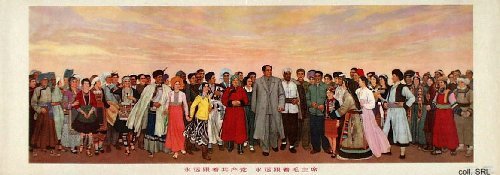 After the adoption of Deng Xiaoping's modernization program, China embarked on a new course that resulted in the so-called 'nine principles for peaceful reunification' proposed by Ye Jianying in 1981. The principles, which would turn Taiwan into a 'special administrative region' of China, were upheld for more than a decade and continue to be upheld until the present, although later some modifications were made. The late 1980s witnessed the historic moment when delegations from both sides started official negotiations about possible reunification.
After the adoption of Deng Xiaoping's modernization program, China embarked on a new course that resulted in the so-called 'nine principles for peaceful reunification' proposed by Ye Jianying in 1981. The principles, which would turn Taiwan into a 'special administrative region' of China, were upheld for more than a decade and continue to be upheld until the present, although later some modifications were made. The late 1980s witnessed the historic moment when delegations from both sides started official negotiations about possible reunification. Deng Xiaoping's formulation of the 'One Country, Two Systems'-paradigm in 1983, considered an encapsulation of the 'nine principles', has laid the theoretical foundation for China's resumption of sovereignty over a number of territories that had been under foreign rule. According to Deng's paradigm, there is one country (China), but within this country, multiple social and/or economic systems can and will exist for a given period of time in certain areas – special administrative regions, next to and in harmony with the social and economic systems that prevail in China. The principle was first put into practice in Hong Kong, and subsequently in Macao. In the eyes of the Chinese leadership, these two cases already have proven that Deng's paradigm can be an excellent vehicle to bring about the future reunification with Taiwan. The Chinese even expressed their willingness to expand the conditions of the principle to accommodate the Taiwanese: no time limit on the period of autonomy; no disbanding of Taiwan's military, etc. Jiang Zemin in particular was seen as a proponent of a quick Taiwanese adoption of Deng's principle. Such a reunification could serve as an eminent opportunity to guarantee him a lasting place in history. The Taiwanese leaders, however, continue to have a different opinion on this matter.
Deng Xiaoping's formulation of the 'One Country, Two Systems'-paradigm in 1983, considered an encapsulation of the 'nine principles', has laid the theoretical foundation for China's resumption of sovereignty over a number of territories that had been under foreign rule. According to Deng's paradigm, there is one country (China), but within this country, multiple social and/or economic systems can and will exist for a given period of time in certain areas – special administrative regions, next to and in harmony with the social and economic systems that prevail in China. The principle was first put into practice in Hong Kong, and subsequently in Macao. In the eyes of the Chinese leadership, these two cases already have proven that Deng's paradigm can be an excellent vehicle to bring about the future reunification with Taiwan. The Chinese even expressed their willingness to expand the conditions of the principle to accommodate the Taiwanese: no time limit on the period of autonomy; no disbanding of Taiwan's military, etc. Jiang Zemin in particular was seen as a proponent of a quick Taiwanese adoption of Deng's principle. Such a reunification could serve as an eminent opportunity to guarantee him a lasting place in history. The Taiwanese leaders, however, continue to have a different opinion on this matter.

 Despite the fact that the 'One Country, Two Systems'-principle contained many opportunities for a solution of the Taiwan conundrum, the Taiwanese leadership continues to see as problematic the definition proposed by China that there is one China and that Taiwan is an inalienable part of it. Although the Taiwanese do not deny the fact that ethnically they are Chinese and are part of the cultural complex that is named Chinese civilization, they do object to the possibility that they will simply be swallowed up and incorporated into a political system they reject. That same Chinese culture has been rediscovered by the CCP elite itself, and is now being hailed by Beijing as an important basis for reunification.
Despite the fact that the 'One Country, Two Systems'-principle contained many opportunities for a solution of the Taiwan conundrum, the Taiwanese leadership continues to see as problematic the definition proposed by China that there is one China and that Taiwan is an inalienable part of it. Although the Taiwanese do not deny the fact that ethnically they are Chinese and are part of the cultural complex that is named Chinese civilization, they do object to the possibility that they will simply be swallowed up and incorporated into a political system they reject. That same Chinese culture has been rediscovered by the CCP elite itself, and is now being hailed by Beijing as an important basis for reunification. At the same time, the negotiations about eventual reunification should not take an eternity and are backed up by regular threats of force. A period of fifty years was deemed adequate. In February 2000, the PRC warned in a White Paper on Taiwan that indefinite refusal to start negotiations would constitute grounds for a military solution.
At the same time, the negotiations about eventual reunification should not take an eternity and are backed up by regular threats of force. A period of fifty years was deemed adequate. In February 2000, the PRC warned in a White Paper on Taiwan that indefinite refusal to start negotiations would constitute grounds for a military solution.

1 comment:
Thank you for a very inssightful overveiw. I am planning on marrying a Taiwanese woman soon and moving there. I found this very helpful for initail stages of my conversations with her politicaly minded father.
Post a Comment